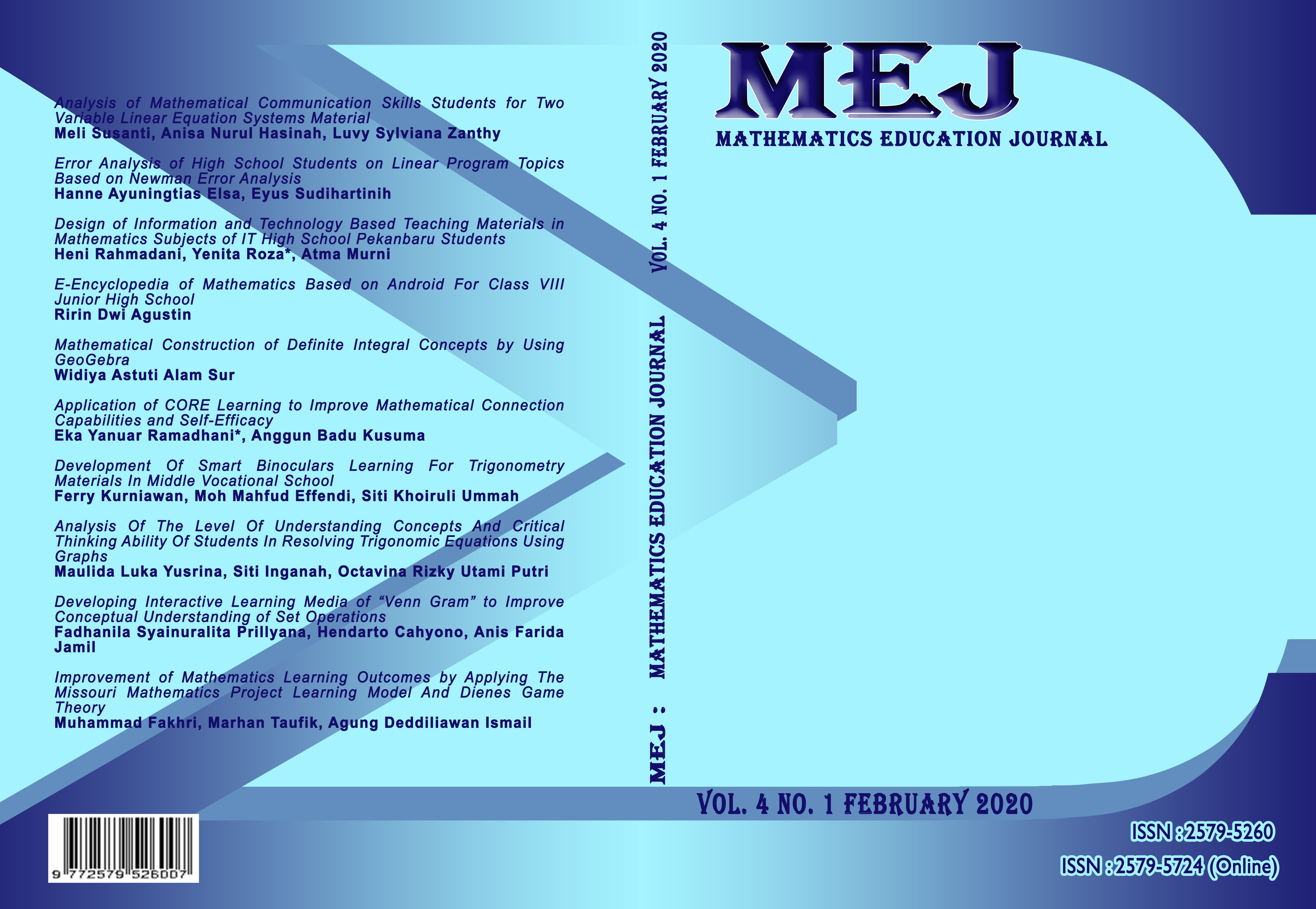Error Analysis of High School Students on Linear Program Topics Based on Newman Error Analysis
DOI:
https://doi.org/10.22219/mej.v4i1.11466Keywords:
Qualitative, error, Newman Error Analysis, linear program, Senior High School.Abstract
This study aims to obtain a description of the errors of high school students on linear program topics by using the Newman Error Analysis. This type of research is a descriptive study with a qualitative approach. This research was conducted by giving a test to participants consisting of a three-word problem on the topic of a linear program then conducting interviews as a data collection technique. Participants in this study were five female students of class XI in one of the senior high schools in Bandung, including four people who were students majoring in Sciences studies and one person who was a student majoring in Social studies. Based on the results of a research according to the Newman Error Analysis, all participants made several types of errors on the topic of a linear program. Errors made by the participants include transformation errors made by three students, the process skill errors made by two students, and writing error answers made by two students.Downloads
References
Andriyani, A., & Ratu, N. (2018). Soal Cerita Pada Materi Program Linear Ditinjau Dari Gaya Kognitif Siswa. Jurnal Pendidikan Berkarakter, 1(1), 16–22.
Ellerton, N., & Clements, M. a. (1992). Implications of Newman research for the issue ofn"What is basic in school mathematics?". 276–284. Retrieved from http://www.merga.net.au/documents/MERJ_7_1_Mitchelmore&White.pdf%5Cnhttp://docs.google.com/viewer?a=v&q=cache:an-TYsBzWUcJ:www.merga.net.au/publications/counter.php?pub=pub_conf&id=1048+%22remedial+mathematics%22&hl=en&gl=au&pid=bl&srcid=ADGEESigIgQhKAB1c
Farida, N. (2015). Analisis Kesalahan Siswa SMP Kelas VIII dalam Menyelesaikan Masalah Soal Cerita Matematika. Jurnal Pendidikan Matematika FKIP Universitas Muhammadiyah Metro, 4(2), 42–52. https://doi.org/10.1145/3132847.3132886
Gunarto, P. A. (2014). Big Bank Soal + Bahas Matematika SMA/MA Kelas 1, 2, & 3. Jakarta: Wahyu Media.
Halim, F. A., & Rasidah, N. I. (2019). Analisis Kesalahan Siswa Dalam Menyelesaikan Soal Cerita Aritmatika Sosial Berdasarkan Prosedur Newman. Jurnal Pendidikan Matematika, 02(01), 35–44.
Indra Puspita Dewi, K., Wisna Ariawan, I. P., & Gita, I. N. (2019). Analisis Kesalahan Pemecahan Masalah Matematika Siswa Kelas Xi Sma Negeri 1 Tabanan. Jurnal Pendidikan Matematika Undiksha, 10(2), 43. https://doi.org/10.23887/jjpm.v10i2.19917
Karnasih, I. (2015). Analisis Kesalahan Newman Pada Soal Cerita Matematis (Newman’S Error Analysis in Mathematical Word Problems). Jurnal Paradikma, 8(April), 37–51. Retrieved from http://digilib.unimed.ac.id/1368/2/Full Text.pdf
Putri, I. S. (2018). Desain Didaktis Pembelajaran Matematika untuk Mengatasi Hambatan Epistimologi pada Konsep Program Linear di SMA. https://doi.org/10.1017/CBO9781107415324.004
Rohaeti, E. E. (2019). Pembelajaran Inovatif Matematika. Bandung: Refika Aditama.
Sudihartinih, E. (2018). Analisis Kesalahan Siswa Dalam Konsep Titik Dan Garis Pada Bidang. Erudio Journal of Educational Innovation, 5(1), 12–18. https://doi.org/10.18551/erudio.5-1.2
Downloads
Published
Issue
Section
License
Authors who publish with MEJ (Mathematics Education Journal) agree to the following terms:
For all articles published in MEJ, copyright is retained by the authors. Authors give permission to the publisher to announce the work with conditions. When the manuscript is accepted for publication, the authors agree to automatic transfer of the publishing right to the publisher.
Authors retain copyright and grant the journal right of first publication with the work simultaneously licensed under a Creative Commons Attribution-ShareAlike 4.0 International License that allows others to share the work with an acknowledgment of the work's authorship and initial publication in this journal.
Authors are able to enter into separate, additional contractual arrangements for the non-exclusive distribution of the journal's published version of the work (e.g., post it to an institutional repository or publish it in a book), with an acknowledgment of its initial publication in this journal.
Authors are permitted and encouraged to post their work online (e.g., in institutional repositories or on their website) prior to and during the submission process, as it can lead to productive exchanges, as well as earlier and greater citation of published work (See The Effect of Open Access).

This work is licensed under a Creative Commons Attribution-ShareAlike 4.0 International License.










